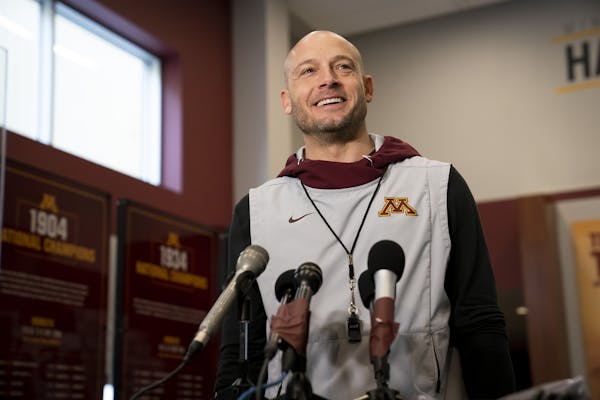During the unrest that followed the tragic death of George Floyd in police custody in Minneapolis last week, Damian Johnson hatched an idea that he hopes could help Minnesota's youth understand racial issues.
The former Gophers standout wants to create a program where kids from the inner city and rural Minnesota connect at a young age. The goal is they "build relationships they wouldn't normally have," Johnson said.
The idea already gained an abundance of positive feedback across the state.
"A lot of coaches reached out to me from outstate Minnesota who want to be part of that change, who want to be part of that next group of kids who want to be leaders," Johnson said. "People wanting to make those small steps now will help us have a bigger and brighter future."
The 33-year-old Johnson was recently named the boys basketball coach at Benilde-St. Maragret's in St. Louis Park this week.
He played for the Gophers from 2006-10. After his pro basketball career ended in 2016, the Louisiana native established his roots in the Twin Cities. He coached at North St. Paul for three seasons, going 57-25, including 18-9 last season.
Johnson received a call from one of his former North St. Paul players who had been arrested after being part of a peaceful protest past curfew around the I-35W bridge. Johnson wasn't upset. The player was an honor roll student but wanted to march against police brutality and for social injustice like so many others.
"They are more outspoken and more open minded," Johnson said about the younger generation. "I think if you get a chance to build those leaders at a young age, the change is going to come quicker. If we can get more young people to be part of that change, it's going to be beneficial."
When it comes to speaking his mind on racial issues, Johnson doesn't shy away from tough conversations on social media. He posed a serious question on Twitter last week: "If you are white and from Minnesota but not from the Twin Cities, how old were you when you had your first conversation with a black person?
Johnson said he was surprised by how many people he met that hadn't talked to a black person until college or later in life when stereotypes were already formed, often negative. That was a reason for him wanting to encourage earlier conversations with people from different backgrounds.
"If you look at it, America has progressed a lot," Johnson said. "But right now, it's a period of so much uncertainty because we have got so many different messages being put out that cause divisiveness. It feels like everything had been progressing great. Then we kind of got to a point where we got stuck. The police brutality part is where I don't think enough people understand. We're not saying all cops want to kill black people. We're seeing a lot of times, we're targeted or people are afraid of you. And you don't know what's going to happen in situations of fear."
Reducing the fear factor would stop many incidents of racial profiling with police, Johnson said. That starts with getting to know each other younger.
"People are more comfortable with athletes and entertainers," Johnson said. "A lot of people have the same stories, but they aren't [celebrities]. You don't get to learn from those stories, but those same people need our help. I think we just have got to get that fear factor away and start building connections and relationships."
For more information on teaming with Johnson and others to build the connection program contact him at damejohn34@gmail.com.
The Timberwolves coaching staff, empowered by Finch and energized by chemistry, is a true asset

Trail section at one of Minnesota's most iconic spots closing for rehab

Will 'shotgun only' zone for deer in southern Minnesota be abolished?

